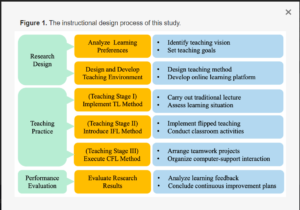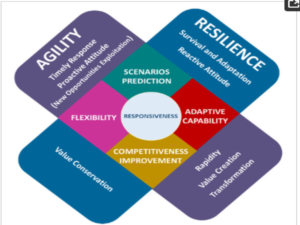Cultivating a Thriving Online Learning Community:
Building Bonds Beyond the Virtual Classroom

Introduction:
In recent years, the advent of online education has emerged as a viable and convenient alternative to the conventional classroom setting, signifying a noteworthy transformation in the educational domain that has transpired within the past few years. The significance of cultivating a sense of community in the realm of education via digital platforms cannot be overstated, as these platforms are instrumental in fortifying global connections to an unprecedented degree. Although e-learning lacks the element of direct interpersonal interaction, it is imperative to establish a thriving and dynamic virtual learning community to fully harness the vast capabilities of this pedagogical approach. Within this blog post, we shall delve into an exploration of the fundamental elements that contribute to the formation of a sense of community within the realm of digital interactions. Additionally, we shall elucidate the various benefits that arise from the cultivation of such a sense of community, particularly in relation to students. Let us embark upon an exploration of the various methodologies through which educators and learners can establish meaningful bonds that transcend the limitations imposed by the virtual educational environment.
Embracing Diversity: The Strength in Views from Many Different Angles

The capacity of online learning to bring together students from different parts of the world, with their own unique histories, cultures, and life experiences is one of its most significant benefits. The many different points of view that are represented here are what make this diversity so valuable. Online communities can become platforms for cross-cultural learning, which helps to promote global understanding and enriches the educational experience. This is accomplished through welcoming and celebrating the individuality of each learner.
Sparking Engagement: Interactive Learning for Lifelong Connections

Participation is essential to the accomplishment of any learning goal or objective. In order to increase engagement in the digital environment, inventiveness and originality are required. A variety of tools, such as interactive discussion forums, group projects, live webinars, and virtual simulations, can be used to cultivate an atmosphere in which students are encouraged to take an active role in the educational process and make meaningful contributions. Participants build connections that will last a lifetime when they actively engage with the content of the course and with their fellow students, which boosts both the learning process and personal development.
Peer Learning: Empowering Learners as Teachers and Students

Within the realm of online education, the idea of collaborative education among peers is a potent driving force. The learning process is transformed into a dynamic exchange of knowledge and expertise when learners are encouraged to take on dual roles as both teachers and students during the course of their education. Explaining ideas to one’s contemporaries is a great way to solidify one’s knowledge of those ideas, increase one’s self-assurance, and concurrently foster a sense of duty toward the expansion of the community.
Nurturing Support Systems: A Pillar of Resilience

Learners could experience feelings of isolation in the digital domain because there is no actual presence to interact with. Constructing solid networks of support is, for this reason, essential in the fight against emotions of isolation and detachment. Learners are able to build safe spaces for one another by using discussion boards, virtual office hours, and individualized feedback from their instructors. These spaces allow students to seek help, share ideas, and work through issues together.
Beyond the Virtual Classroom: Networking and Career Opportunities

The limitations of the course platform are not the only thing that online learning communities expand beyond. Through active participation in community debates, one can create opportunities for professional networking, so developing relationships with other professionals that may lead to career advancement and prospects. These relationships are further strengthened by alumni networks, which enable learners to remain engaged in the community long after they have finished their studies.
Celebrating Achievements: Fostering a Sense of Belonging
It is crucial to developing a pleasant and loving learning environment to acknowledge and celebrate the successes of the individuals who are being educated. Whether it’s praising significant accomplishments or rejoicing in an individual’s progress, providing learners with opportunities for positive reinforcement helps them feel like they belong in the community and boosts their sense of self-worth.

To summarize, the establishment of a successful online learning community is the result of a concerted effort on the part of instructors, students, and support personnel. In order to create connections that extend beyond the confines of a virtual classroom, it is essential to address issues such as inclusivity, stimulating participation, facilitating peer learning, cultivating support systems, and rewarding accomplishments. The power of community is something that will never become obsolete and will always be an essential part of the learning process, despite the ongoing impact that technology has and will continue to have on education. Educators and students alike have the ability to liberate the full potential of online education by engaging in community-building initiatives, which will result in the creation of an ecosystem of growth, support, and relationships that will last a lifetime.

Thank you for your thorough response Honey. Your video/article links and deep connections to the content were great to read!
I most appreciated your organization of the topics into relevant and interesting sections. Particularly, the sections about diversity and the opportunities for cross-cultural learning, and the importance of nurturing support systems. The fact that online educators are still so dedicated to creating connection gives me hope for the future of youth learning online — an idea that previously frightened me a bit!
Hi Honey,
I thought you brought up some interesting points about networking and career opportunities. This is an area I had not thought about when I pictured online collaboration. I also liked the idea of celebrating achievements online. I think for some people they feel that learning online might mean lack of connection but as you stated in your blog it can be quite the opposite!
Thank you for sharing your thoughts!